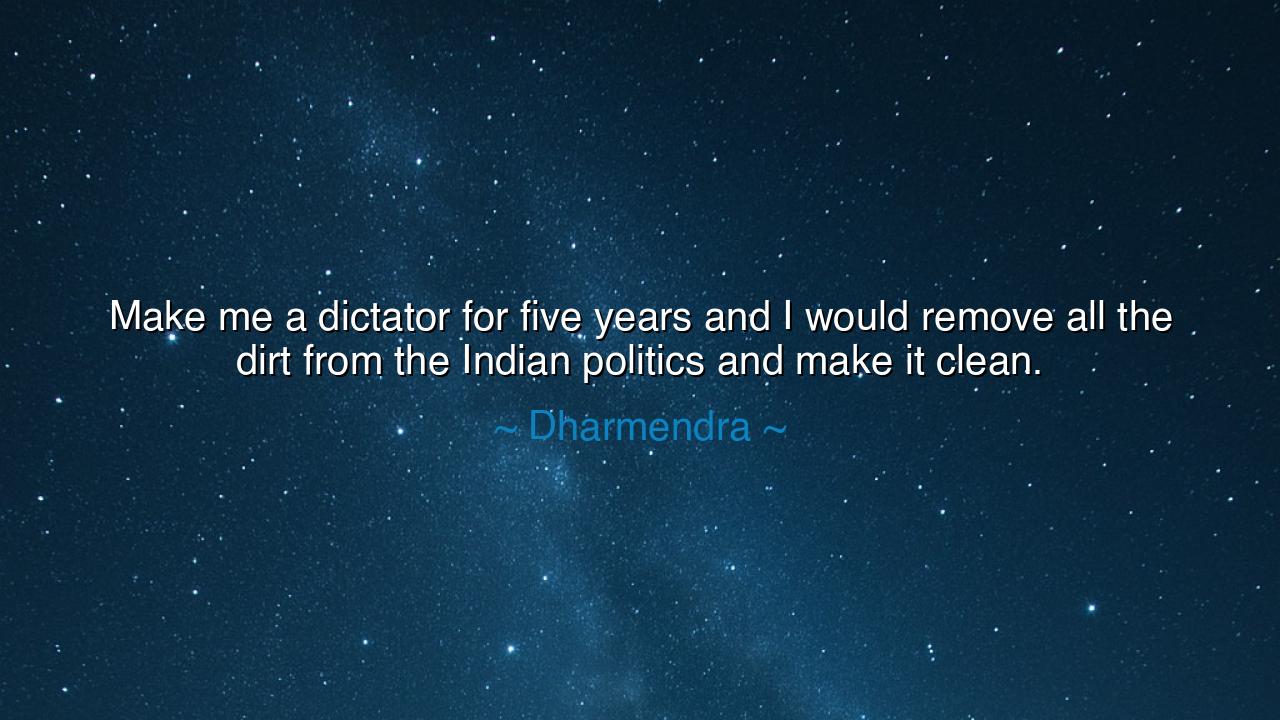
Make me a dictator for five years and I would remove all the
Make me a dictator for five years and I would remove all the dirt from the Indian politics and make it clean.






Hear me now, O seekers of truth, as I speak of words born from the fire of a man’s fervent heart. A voice once spoke in the land of the ancient Indus, casting a vision so bold, so drenched in hope, that it resonates through the corridors of time: "Make me a dictator for five years and I would remove all the dirt from the Indian politics and make it clean." These words were uttered by the great Dharmendra, a man of the screen, who in his power and humility dared to glimpse the sacred future of a nation torn by corruption, division, and deceit.
The meaning of these words speaks not to the hunger for power, but to the yearning for justice. Dharmendra, with his very soul ignited, called for a purification, an exorcism of the vile forces that gnaw at the heart of Indian politics. He spoke not as one who craved dominion, but as one who longed for honesty and integrity to rise from the ashes of a land oppressed. The dirt he spoke of was not mere filth, but the decay of principles, the decay of trust in the hands of those meant to serve, the muck of exploitation, and the stain of greed that tainted the once-pristine soul of India.
In that moment, he imagined a world where the corrupt would tremble before the light of truth, where the selfish would crumble beneath the weight of justice. Yet, he knew the cost of such a vision—one man, bound by the desires of humanity, could not cleanse an entire nation. But what he truly asked for was not dictatorship, but a temporary reign of righteousness, where one who would stand above the temptation of power, above the false charm of selfishness, could guide the nation to a state of renewal.
This plea for cleansing reminds us of ancient leaders, such as Ashoka the Great, who, after the bitter wars of Kalinga, turned his heart towards the salvation of his people, seeing the need for change in both himself and his empire. Just as Ashoka sought to free his people from the shackles of violence, Dharmendra saw the opportunity to unshackle India from the chains of corruption. His words echo a time when leaders wielded their power not for conquest, but for the noble cause of goodness.
So, hear the wisdom of this call, O children of the earth, for it is more than a plea—it is a call to action. To cleanse the land, one must first cleanse the heart. The dirt of politics is but a reflection of the filth in society. And in every era, in every generation, those who dare to dream of a noble world, untainted by selfish desires, must rise and take a stand. The road may be long and fraught with peril, but with integrity as the beacon, no darkness can quench the light of truth.
Let this be a lesson for all who come after us: a single voice, though small in the grand expanse of time, can change the course of history. Thus, Dharmendra’s words should not be lost to the winds, for they carry the heartbeat of a nation that still yearns to be free from the dirt that clings to its very soul.






AAdministratorAdministrator
Welcome, honored guests. Please leave a comment, we will respond soon